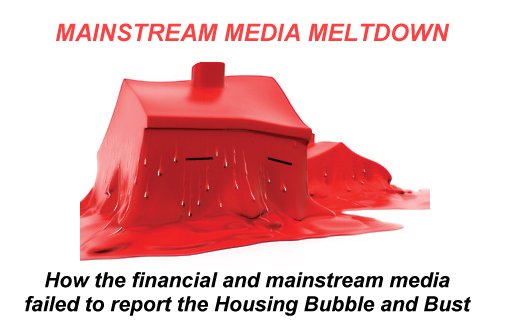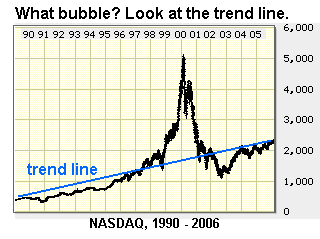

|
| weblog/wEssays archives | home | |
|
Media Meltdown: Unreporting the Housing Bubble (February 5, 2008) Need some comic relief? Check out the alarmist cover of BusinessWeek which shouts, Meltdown: for housing the worst is yet to come. 
Uh, can you say "Duh!"? Where were these clowns in 2005 or even 2006, when the bubble was expanding and they could have warned readers to stay out of the market? Indeed--where was the entire mainstream media? Missing in action, at every step of the way. Now that the horses have long left the barn, BusinessWeek is on top of the story: "Barn door left wide open, horses have vanished into the night! Woe is us! Who could've predicted an open barn door would lead to this catastrophe?"
The Standard & Poor's/Case-Shiller 20-city home price index fell 7.7% in November from the year before, the biggest decline since the index was created in 2000.You mean just like all of us housing bloggers have been saying--and providing charts to support the case--for years? Were housing blogs some sort of secret which was unavailable to BusinessWeek editors?
A Harris Interactive survey for Zillow.com in December found that 36% of homeowners thought their homes had increased in value over the past year, vs. 23% who thought they had decreased. That willful optimism translates directly into the record overhang of unsold existing homes: more than 4 million.Golly, I wonder where the average American got the idea that his/her house is still climbing in value. Could it possibly be the relentless cheerleading about housing's never-ending rise they saw on TV, heard on radio, read in newspapers and magazines, and saw on MSM Websites?
A 20% decline in home prices would wipe out the equity of 67% of people who bought last year, Zillow.com estimates.  And where were you, "watchdog press"? Protecting the citizenry with hard, skeptical
reporting on the housing boom's inevitable bust? Warning readers in front-page stories
that a reversion to trend was inevitable? Hardly. To quote Mogambo: hahahahahahahahaha.
And where were you, "watchdog press"? Protecting the citizenry with hard, skeptical
reporting on the housing boom's inevitable bust? Warning readers in front-page stories
that a reversion to trend was inevitable? Hardly. To quote Mogambo: hahahahahahahahaha.
BusinessWeek ran a chart of the S&P 500 stock index to illustrate how bubbles revert to trendlines. Sorta like my chart from over two years ago, which used the Nasdaq to illustrate the same point.
Exactly how difficult was it in 2004 to suggest that this trend was unsustainable and
would likely reverse?
How difficult would it have been to explore the historical declines which followed
previous, less extreme housing bubbles?
We all know the government regulators were asleep at the wheel; so what's the media's excuse? Why wasn't the financial media reporting the dangers so visibly inherent in no-document, no-down loans, and all the other chicanery which enabled the lending bubble which then begat the housing bubble? Isn't educating the public about the dangerous lack of regulation, and being skeptical of government and "received wisdom" from those business interests reaping huge gains the fundamental purpose of the Free Press? Yes. Bottom line: the mainstream and financial media failed the American public, completely, utterly, inexcusably. Their coverage of the inevitable collapse of the housing bubble and the dangers inherent in the lending bubble was a travesty of a mockery of a sham (to quote Woody Allen). I have subscribed to the Wall Street Journal, Barrons and BusinessWeek for years, as well as the San Francisco Chronicle and major magazines of opinion like The Atlantic Monthly, The New Republic, and The National Review. I do not recall a single feature (front-page) story which called into question or predicted the obvious ruin which would inevitably result from 1) the lending bubble and 2) the housing bubble, nor did any major publication question whether the past seven years of "prosperity" created by this debt explosion was in fact a false prosperity. Yes, there were occasional glimmerings of reality, if you have read very widely; Alan Abelson over at Barrons has been a skeptic, and on occasion that publication and the Journal offered up some decent reporting. But it was never consistent, or on page one. I would forgive the corporate media if they had set out to argue, with statistics and solid reporting, how past bubbles in stocks and real estate always ended in dramatic, long-term declines, but "this time was different." Perhaps it was understood no such argument could be made, unless it was a satire of blind buffoonery. Meanwhile, over in the blogosphere, the consequences of the housing bubble were being reported daily, and in great detail. It's not as if the Coming Bust was some obscure secret; the mainstream media was perfectly aware of what was being reported in the blogosphere, and the editors and management chose to ignore what was being reported, in favor of relentless cheerleading and brain-dead reporting of government-distorted "facts." Does anyone think the mainstream media will report the Bust any better than they reported the Boom? Whose interests were served by the MSM's seven years of cheerleading? Aren't those same interests being served by underplaying the Bust?
NOTE: contributions are humbly acknowledged in the order received. Your name and email remain confidential and will not be given to any other individual, company or agency. Thank you, William R. ($20), for your thoughtful donation in support of this humble site. I am greatly honored by your contribution and readership. All contributors are listed below in acknowledgement of my gratitude.
Thank you, Charles W. ($20), for your much-valued donation in support of this humble site. I am greatly honored by your contribution and readership. All contributors are listed below in acknowledgement of my gratitude.
copyright © 2008 Charles Hugh Smith. All rights reserved in all media. I would be honored if you linked this wEssay to your site, or printed a copy for your own use. |
||
| weblog/wEssays | home |